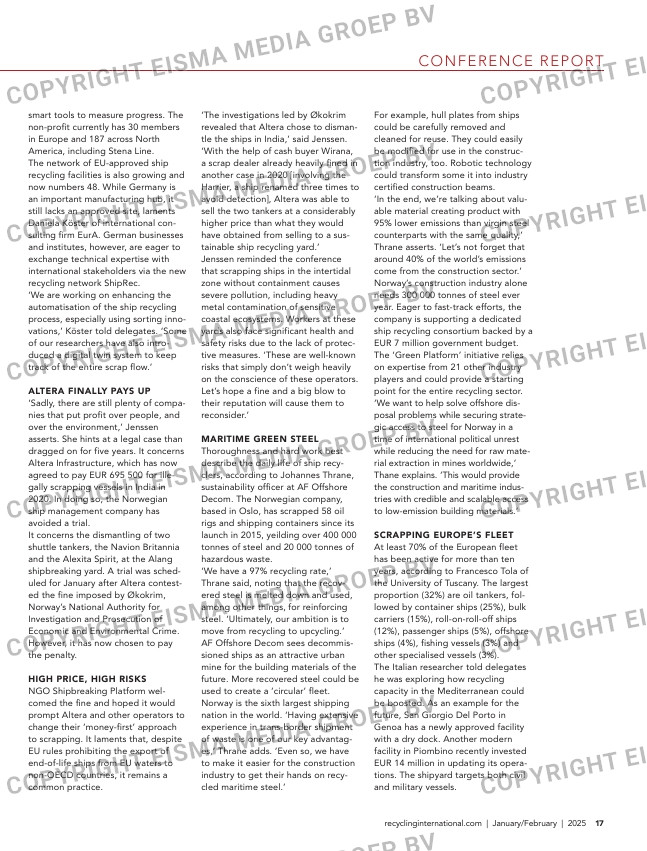Page 17 from: Recycling International Jan/Feb 2025

CONFERENCE REPORT
17recyclinginternational.com | January/February | 2025
smart tools to measure progress. The
non-profit currently has 30 members
in Europe and 187 across North
America, including Stena Line.
The network of EU-approved ship
recycling facilities is also growing and
now numbers 48. While Germany is
an important manufacturing hub, it
still lacks an approved site, laments
Daniela Köster of international con-
sulting firm EurA. German businesses
and institutes, however, are eager to
exchange technical expertise with
international stakeholders via the new
recycling network ShipRec.
‘We are working on enhancing the
automatisation of the ship recycling
process, especially using sorting inno-
vations,’ Köster told delegates. ‘Some
of our researchers have also intro-
duced a digital twin system to keep
track of the entire scrap flow.’
ALTERA FINALLY PAYS UP
‘Sadly, there are still plenty of compa-
nies that put profit over people, and
over the environment,’ Jenssen
asserts. She hints at a legal case than
dragged on for five years. It concerns
Altera Infrastructure, which has now
agreed to pay EUR 695 500 for ille-
gally scrapping vessels in India in
2020. In doing so, the Norwegian
ship management company has
avoided a trial.
It concerns the dismantling of two
shuttle tankers, the Navion Britannia
and the Alexita Spirit, at the Alang
shipbreaking yard. A trial was sched-
uled for January after Altera contest-
ed the fine imposed by Økokrim,
Norway’s National Authority for
Investigation and Prosecution of
Economic and Environmental Crime.
However, it has now chosen to pay
the penalty.
HIGH PRICE, HIGH RISKS
NGO Shipbreaking Platform wel-
comed the fine and hoped it would
prompt Altera and other operators to
change their ‘money-first’ approach
to scrapping. It laments that, despite
EU rules prohibiting the export of
end-of-life ships from EU waters to
non-OECD countries, it remains a
common practice.
‘The investigations led by Økokrim
revealed that Altera chose to disman-
tle the ships in India,’ said Jenssen.
‘With the help of cash buyer Wirana,
a scrap dealer already heavily fined in
another case in 2020 [involving the
Harrier, a ship renamed three times to
avoid detection], Altera was able to
sell the two tankers at a considerably
higher price than what they would
have obtained from selling to a sus-
tainable ship recycling yard.’
Jenssen reminded the conference
that scrapping ships in the intertidal
zone without containment causes
severe pollution, including heavy
metal contamination of sensitive
coastal ecosystems. Workers at these
yards also face significant health and
safety risks due to the lack of protec-
tive measures. ‘These are well-known
risks that simply don’t weigh heavily
on the conscience of these operators.
Let’s hope a fine and a big blow to
their reputation will cause them to
reconsider.’
MARITIME GREEN STEEL
Thoroughness and hard work best
describe the daily life of ship recy-
clers, according to Johannes Thrane,
sustainability officer at AF Offshore
Decom. The Norwegian company,
based in Oslo, has scrapped 58 oil
rigs and shipping containers since its
launch in 2015, yeilding over 400 000
tonnes of steel and 20 000 tonnes of
hazardous waste.
‘We have a 97% recycling rate,’
Thrane said, noting that the recov-
ered steel is melted down and used,
among other things, for reinforcing
steel. ‘Ultimately, our ambition is to
move from recycling to upcycling.’
AF Offshore Decom sees decommis-
sioned ships as an attractive urban
mine for the building materials of the
future. More recovered steel could be
used to create a ‘circular’ fleet.
Norway is the sixth largest shipping
nation in the world. ‘Having extensive
experience in trans-border shipment
of waste is one of our key advantag-
es,’ Thrane adds. ‘Even so, we have
to make it easier for the construction
industry to get their hands on recy-
cled maritime steel.’
For example, hull plates from ships
could be carefully removed and
cleaned for reuse. They could easily
be modified for use in the construc-
tion industry, too. Robotic technology
could transform some it into industry
certified construction beams.
‘In the end, we’re talking about valu-
able material creating product with
95% lower emissions than virgin steel
counterparts with the same quality,’
Thrane asserts. ‘Let’s not forget that
around 40% of the world’s emissions
come from the construction sector.’
Norway’s construction industry alone
needs 300 000 tonnes of steel ever
year. Eager to fast-track efforts, the
company is supporting a dedicated
ship recycling consortium backed by a
EUR 7 million government budget.
The ‘Green Platform’ initiative relies
on expertise from 21 other industry
players and could provide a starting
point for the entire recycling sector.
‘We want to help solve offshore dis-
posal problems while securing strate-
gic access to steel for Norway in a
time of international political unrest
while reducing the need for raw mate-
rial extraction in mines worldwide,’
Thane explains. ‘This would provide
the construction and maritime indus-
tries with credible and scalable access
to low-emission building materials.’
SCRAPPING EUROPE’S FLEET
At least 70% of the European fleet
has been active for more than ten
years, according to Francesco Tola of
the University of Tuscany. The largest
proportion (32%) are oil tankers, fol-
lowed by container ships (25%), bulk
carriers (15%), roll-on-roll-off ships
(12%), passenger ships (5%), offshore
ships (4%), fishing vessels (3%) and
other specialised vessels (3%).
The Italian researcher told delegates
he was exploring how recycling
capacity in the Mediterranean could
be boosted. As an example for the
future, San Giorgio Del Porto in
Genoa has a newly approved facility
with a dry dock. Another modern
facility in Piombino recently invested
EUR 14 million in updating its opera-
tions. The shipyard targets both civil
and military vessels.
Fotobijschrift
KADERKOP
??
Automatisation and other new
tools are making ship recycling
a smarter, cleaner industry.
16-17-18-19_shiprecycling.indd 17 29-01-2025 11:22



